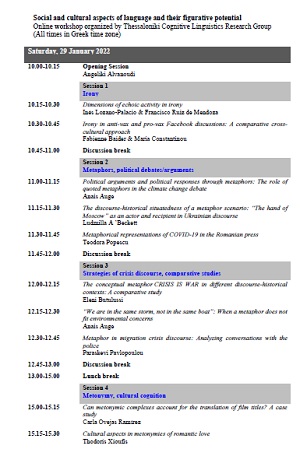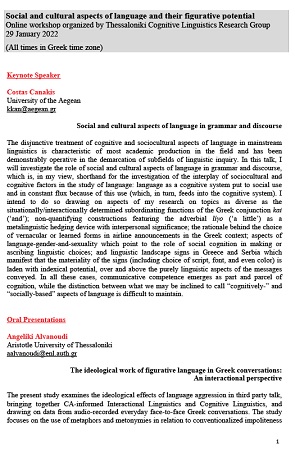Social and cultural aspects of language and their figurative potential
Proposed online workshop organized by Thessaloniki Cognitive Linguistics Research group 29 January 2022
The aim of the workshop is to carry out research on the cognitive and sociocultural aspects of languages also accounting for the figurative extensions. Cognitive Linguistics has mainly analyzed majority languages (English in particular) from a synchronic perspective showing limited interest in social and multimodal aspects of communication (Divjak et al. 2016). In recent years there has been growing interest in socially and culturally situated cognition and empirically grounded cognitive linguistic research, as is evidenced, inter alia, by studies on cognitive sociolinguistics (Geeraerts et al. 2010; Kristiansen & Geeraerts 2013; Pütz et al. 2014), social cognitive linguistics (Croft 2009), cultural linguistics (Sharifian 2017), and studies on cognitive linguistics and interactional discourse (Zima & Brône 2015). The proposed workshop considers figurative thought and language as a promising area of research within the ‘sociocultural turn’ of the Cognitive Linguistics framework, and aims to shed light into data from languages for which research on the cognitive and sociocultural aspects also exploring the figurative perspective remains limited. More specifically, the workshop aims to examine the role of figurative thought in the interplay between social, cognitive and cultural aspects of language use, focusing on language variation, cultural models in speech communities, the ideological dimensions of political/parliamentary discourse and the press, the relation between multimodal discourse, culture, and ideology/power, to name some aspects of the broad sociocultural field of research.
Call for Papers
The workshop brings together researchers working across Cognitive Linguistics, sociolinguistics, critical discourse analysis, pragmatics, and multimodal communication. We invite contributions including, but not limited to, the following topics:
- the ideological dimensions and the power of figurative language (metaphor, metonymy, irony) in all aspects of social and cultural practice, such as the medical discourse on the covid19 pandemic, fake news and the emotions evoked, strategies of crisis discourse;
- figurative language in linguistic landscapes;
- figurative language in usage-based approaches;
- figurative language in social varieties and registers;
- figurative language and racial/gender discrimination;
- figurative language and creativity in constructions revealing verbal aggression/impoliteness.
The workshop will include a roundtable discussion especially focusing on the social and cultural aspects of Greek language together with figurative idiosyncrasies. A list of invited speakers will be announced in due course.
There will be no fees for participation.
If you are interested in presenting a paper in the workshop, please send your abstract (min. 350 and max. 500 words) by 30 September 2021 to: aalvanoudi@enl.auth.gr.
Notification of acceptance will be sent by 31 October 2021.
References
Croft, W. A. 2009. Toward a social cognitive linguistics. In New Directions in Cognitive Linguistics, ed. by V. Evans & S. Pourcel, 395-420. Amsterdam: John Benjamins.
Divjak, D., Levshina, N. & Klavan, J. 2016. Cognitive Linguistics: Looking back, looking forward. Cognitive Linguistics 27(4): 447-463.
Geeraerts, D., Kristiansen, G. & Peirsman, Y. (eds.). 2010. Advances in Cognitive Sociolinguistics. Berlin: Mouton de Gruyter.
Kristiansen, G. & Geeraerts, D. (eds.). (2013). Contexts in Use in Cognitive Sociolinguistics. Special Issue of Journal of Pragmatics 52: 1-104.
Pütz, M., Robinson, J. A. & Reif, M. (eds.). (2014). Cognitive Sociolinguistics: Social and Cultural Variation in Cognition and Language Use. Amsterdam: John Benjamins.
Sharifian, F. (2017). Cultural Linguistics. Amsterdam: John Benjamins. Zima, E. & Brône, G. (eds.). (2015). Special issue on Cognitive Linguistic applications to the study of interactional discourse. Language and Cognition 7.

